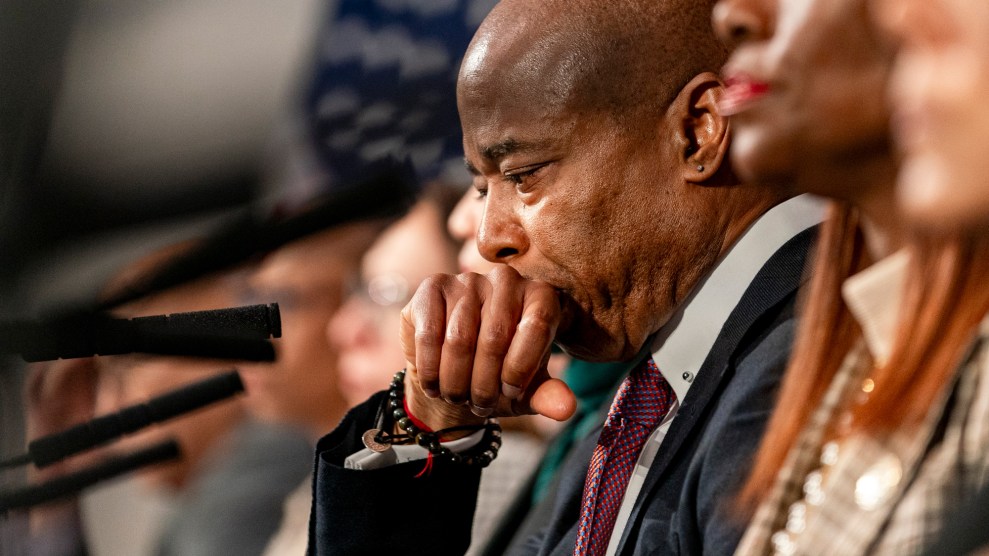
Peter K. Afriyie/AP
Not long after Eric Adams won the Democratic primary for mayor of New York City in June 2021, a lot of people who are paid to be smart about such things began to speculate about what was next.
A Wall Street Journal columnist asked if “Manchin-Adams” was “the future of the Democratic party.” Bret Stephens predicted in the New York Times that “Eric Adams is going to save New York.” Lis Smith, the oft-quoted Democratic consultant, told Politico he was “a voice we really need in the Democratic Party right now.” The Democratic Congressional Campaign Committee invited Adams to speak to the group to offer messaging tips. President Joe Biden invited him to the White House, and Ron Klain, the president’s then-chief-of-staff, told a reporter their campaigns were “not dissimilar.” Adams called himself “the Biden of Brooklyn.”
Columnists and politicos weren’t the only people trading on Adams’ future political prospects.
“It’s probably foolish to think a NYC mayor will successfully translate into being a national political figure, but I still think Eric Adams would be in my top 5 for ‘who will be the next Democratic presidential nominee after Joe Biden?’” Nate Silver wrote on Twitter in 2022.
“He’s going to be good at getting media attention,” Silver continued, “and he has a chance of carving out a niche that’s different from what other Democrats are offering.”
Well, he’s certainly carved out a niche. On Thursday, after months of intensifying speculation, federal prosecutors in Manhattan announced that Adams had been indicted on five counts, including bribery, wire fraud, and soliciting illegal foreign campaign donations. Adams has proclaimed his innocence and has vowed to stay in office while he fights the charges. But we’re now long past the point of anyone talking about his presidential prospects.
Adams was a convenient figure in 2021 and early 2022—not because of what he actually represented, but because of what they imagined he forestalled. The Biden set, who harbored chips on their shoulders from the 2020 presidential primary—when the Times had endorsed two different senators instead of him—saw a chance to stick it to the elitist progressives who had scorned him, and re-stake their claim as the true tribunes of the Democrats base. People who believed that the protests against police had simply gone too far, saw, in the elevation of an ex-Republican ex-cop, a chance to restore the natural balance of power.
There was always a lot of projection to this picture of Adams. In the general election, he had faced token opposition from a Republican who lived in a studio apartment with 15 cats; it was not clear why Democrats who were arguing over how to beat Republicans should fixate on a Democrat who had never really had to.
The mayoral primary was hardly the proxy contest that national Democrats wanted it to be, either. Adams prevailed by a few thousand votes in a ranked-choice election over a moderate sanitation commissioner. It was an interesting election if you were interested in urban politics, the growing divide between homeowners and renters, the enduring influence of the New York Post, and the voting trends of ultra-Orthodox Jewish communities and outer-borough Chinese-American small-business owners. But the politics of an election in a one-party city did not neatly map onto Super Tuesday—and Eric Adams was hardly the champion anyone claimed.
According to the indictment, Adams’ alleged corruption dated back to his time as Brooklyn borough president, when he “began building relationships with foreign nationals who were seeking to influence him.” While the depth and details of his alleged entanglement with foreign moneymen was not known during the campaign, the idea that Adams’ relationships with unseemly businesspeople and fixers would lead to his downfall was always there. It wasn’t exactly a huge shock that this is who Eric Adams was. Even Andrew Yang saw this coming:
Elections have consequences, and one consequence of Adams’ three years of governance is that there is, at the moment, astonishingly little New York City government to speak of. The police commissioner resigned in September amid an investigation related to nightclubs. The feds just raided the offices of his interim replacement. Two former fire chiefs were just indicted. The schools chief announced his forthcoming resignation less than a month into the school year, after the FBI seized his phones. The sheriff is being investigated. The city’s chief counsel recently resigned. The health commissioner stepped down. The libraries were part-time for a year because Adams invented a recession. The mayor seemed to spend a disproportionate amount of time personally scuttling minor neighborhood improvements with the help of his top-deputy—a vocal opponent (like Adams) of the separation of church and state who has claimed, somewhat plausibly, to have not ridden the subway in 40 years. Basic services don’t work anymore. Adams gave a key to the city to Diddy. In 2023.
The only people who really ate good in Adams’ New York were the cops. The NYPD’s communications department doubled to a whopping 86 staffers, who got to work churning out low-budget Michael Bay films about their raids on student protesters. Police overtime for subway patrol went from $4 million when Adams took office to $155 million. He returned a sense of impunity to the force. Recently, he praised the NYPD for its “restraint” after a cop shot another cop at a subway station, along with three other people—one of whom now has brain damage.
As it happens, columnists and politicos weren’t the only people trading on Adams’ future political prospects for their own causes. The idea that Adams might someday run for president features prominently in the unsealed indictment. During one of his frequent trips to Istanbul, according to prosecutors, an unnamed Turkish businessman agreed to illegally donate at least $50,000 to Adams’ mayoral campaign, “believing that ADAMS might one day be President of the United States and hoping to gain influence.” (Those contributions ultimately fell through, after the businessman’s “legal troubles in Turkey and the United States became more public.”)
The people hyping Eric Adams as the future were always selling a bill of goods. We just didn’t realize it was so literal.

















